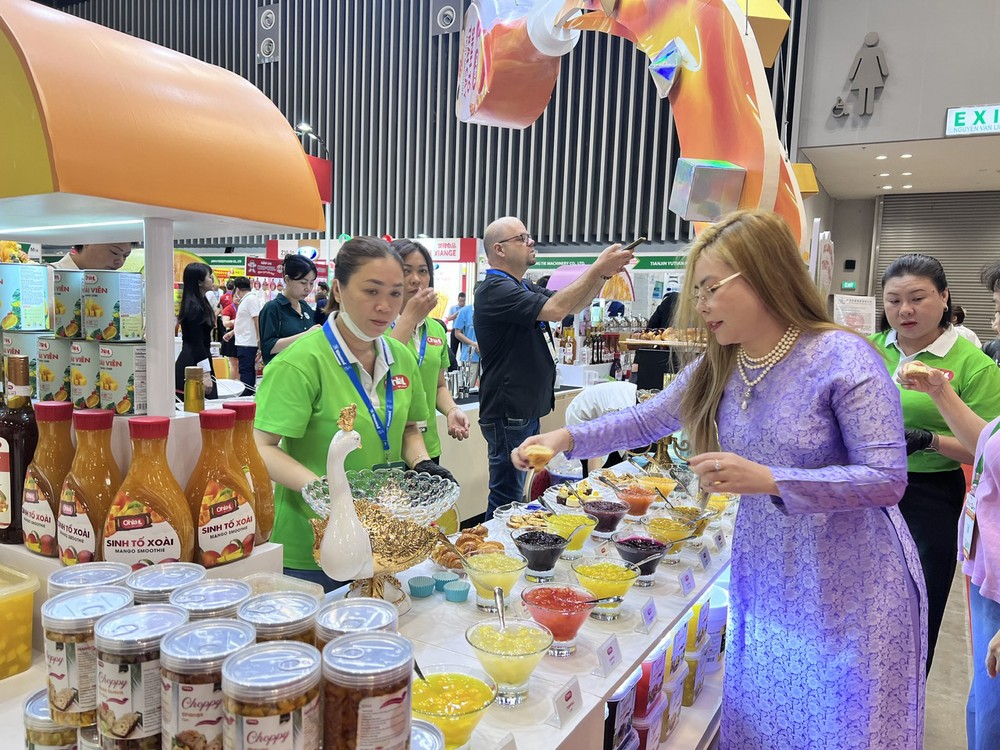
However, starting in early 2025, in order to access more export markets, businesses in this sector are required to adopt sustainable practices.
Having previously caused a sensation in the South Korean and Japanese markets with a range of products including Kenju cakes, Jinju rice cakes, and Oatmeal oatcakes, in June, Richy Food Corporation continued to conquer the U.S. market through the Saigon Market and Mekong Market supermarket chains.
Sharing her joy about this achievement, Ms. Nguyen Thi Bich Son, Brand Manager for Richy Food Corporation in the southern region, explained that to be exported to the mentioned countries, their partners conducted numerous surveys, even visiting the production areas to assess cultivation regions, raw materials, and various criteria.
Amongst requirements, having safe and standard input materials is mandatory but not sufficient. To collaborate with import partners and introduce products to the export market, businesses have continuously created new product lines that showcase the unique cultural identity of Vietnam.
According to Ms. Son’s revelation, in addition to the three aforementioned markets, the processed food products of this company are now present in over 30 countries and territories worldwide, bringing the company’s annual revenue to VND2,000 billion.
Similarly, Luong Gia Food Technology Joint Stock Company has been exporting dried fruit and cereal products to approximately 20 countries worldwide, with a consistent annual revenue growth of 20 percent. According to the company’s director Luong Thanh Thuy, to win over global consumers, the company’s products must ensure quality, distinctive flavors, and meet certifications such as BRC, FSSC, ISO, HACCP, and region-specific requirements like FDA and Halal certification.
According to Chairwoman Ly Kim Chi of the Ho Chi Minh City Food Association (FFA), the food processing industry is the only sector where the export proportion to the domestic market is higher than to foreign markets. Vietnamese businesses have maximized the unique characteristics of local agricultural products and Vietnamese fruits to create distinctive food products that are exclusive to Vietnam.
Therefore, the position of Vietnamese-branded processed food products is increasingly important in the global supply chain as well as in the world market. Most businesses under the Ho Chi Minh City Food Association (FFA) have orders until the end of December 2024.
Some units have even received orders until the end of the first quarter of 2025. This has contributed to a strong 35 percent increase in export revenue for food and food products during the first 7 months of this year, reaching over $3 billion, accounting for 15 percent of the total export turnover of Ho Chi Minh City.
However, although food processing businesses in Ho Chi Minh City are presently experiencing good growth with promising revenue, upcoming trends will bring significant changes that require adaptation. Specifically, starting from 2025, food exporters in the European market will be required to meet green criteria.
Additional information about this trend comes from Ms. Phan Thi Thang, Deputy Minister of Industry and Trade. She explains that sustainable development trends in the food industry are continuously updated and developed, covering aspects such as food safety, ensuring eco-friendliness, and sustainable use of organic raw materials. This includes practices like reusing and recycling waste or excess products from the production process, as well as measures to reduce plastic usage and overall packaging.
Ms. Phan Thi Thang sees this as both a challenge and an opportunity for Vietnam’s food processing sector to evolve and grow.
Being a businesswoman, Ms. Ly Kim Chi said that although companies are aware that greening is a mandatory requirement, many of them struggle with where to begin their green initiatives. Some may know but lack the necessary financial resources to implement these changes. This is a challenge for businesses, especially for small and medium-sized enterprises.
Therefore, the FFA recommended that regulatory agencies and banking institutions provide capital support for businesses so that they can invest in greening production. Specifically, prioritizing funding for export-oriented enterprises that invest in environmentally friendly practices, shared Ms. Ly Kim Chi.
Meanwhile, Chairman Nguyen Ngoc Hoa of the Ho Chi Minh City Business Association and Chairman of the Council of Members of the Ho Chi Minh City State Financial Investment Company (HFIC), emphasizes that capital is a crucial issue for greening initiatives.
Currently, Ho Chi Minh City has been approved by the National Assembly through the Resolution 98, which subsequently issued the Resolution 09 to provide interest rate support for investment projects financed by HFIC in priority areas of economic and social development within the city. Specifically, the implementation of green and digital transformations will receive 100 percent interest rate support.
Mr. Nguyen Ngoc Hoa further explains that HFIC has been assigned to provide loans and interest rate support according to the Resolution 09.
The organization is fully prepared and has established a working group to implement this. Therefore, businesses need to proactively seek access to early capital funding and interest rate support from HFIC to build internal capacity for green transformation and enhance competitiveness in the market.
It is crucial to keep up with the green commerce trend and avoid the risk of market closures when major export markets officially apply green barriers to imported goods.
























